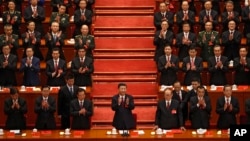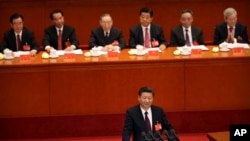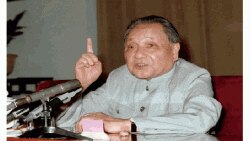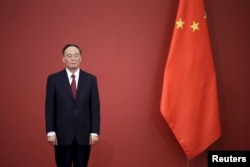China’s President Xi Jingping is now considered among the most influential of the country’s leaders.
China’s Communist Party added Xi’s political thought to its constitution during the closing session of its 19th Party Congress. Only two other Chinese leaders have had their ideas added to the constitution in this way: They are Mao Zedong and Deng Xiaoping.
The congress chooses the party’s leaders and presents policy for the next five years.
Observers say the move shows that Xi might seek a third term. They also note that there is no apparent successor to Xi among Chinese leaders at this time.
Xi Jingping thought now part of China’s constitution
Chinese state media praised as “historic” the move to put Xi Jinping’s “Thought on Socialism With Chinese Characteristics for a New Era” into the constitution.
The change passed without opposition.
The amendment to the constitution says “Xi Jinping Thought” will provide a guide for China’s development on a “long-term basis.”
In addition to adding Xi’s name and political ideas, amendments established the party’s “absolute” leadership over the military and society.
Among the important policy moves is a major anti-corruption campaign that has targeted both powerful and lower level officials. Another initiative is the “Belt and Road” development project, which seeks to spend billions of dollars on infrastructure-related projects in Asia, Africa and Europe.
When he took power in 2012, Xi spoke of a “Chinese Dream” an idea for the redevelopment of China into a great, modern nation.
In his speech at the start of the congress, Xi promised that China would become what he called a modern socialist country by 2035. He also said by 2050, China would be a leading world power.
Near the close of the meeting, Xi called the party congress a success. He said the Chinese people embrace the possibilities of a bright future.
Will Xi stay in power beyond his term?
Willy Lam is with the Center for China Studies at the Chinese University of Hong Kong.
He told VOA that he believes Xi will seek to stay in power beyond the end of his second term in 2022.
China’s Constitution states that the president can only serve two terms. Also, the party traditionally requires leaders who are 68 or older to step down. Xi is currently 64-years-old.
However, Lam says Xi could step aside as party chairman but keep control of China’s powerful Central Military Commission as Deng Xiaoping did. He could also remain chairman of the country’s national security commission, which oversees the police.
Lam said, “According to long established tradition, whomever controls the army and the police controls everything, not to mention the fact that he has this additional title of core leader.”
However, Lam is concerned that Xi’s gathering of power represents a step backward. He notes that China’s reform leader Deng Xiaoping “was adamant in repudiating one-person rule.” Deng also forbid a “cult of personality” from being set up around leaders and helped set up age and term limits.
No apparent successor
Xi received the title of core leader about a year ago. The title represents a level of power not seen since Deng led “reform and opening up” efforts to modernize China.
Experts note that there is no one who is considered able to take Xi’s place in five years.
The head of the party’s Central Commission for Discipline Inspection, Wang Qishan, is considered the second most powerful man in China. He has overseen Xi’s anti-corruption campaign, which has brought down a number of powerful competitors in the party.
But Wang’s name was not included on a list of leading party officials on the Central Committee.
On Wednesday, the members of the Politburo Standing Committee are to be announced. The Politburo Standing Committee is a small group of about seven members, including Xi, who hold top positions.
I’m Mario Ritter.
Bill Ide reported this story for VOA News. Mario Ritter adapted it for VOA Learning English with additional material from AP and Reuters. Hai Do was the editor.
_______________________________________________________________
Words in This Story
characteristics –n. the special qualities of a person or group
absolute –adj. total, complete, unquestioned
initiative –n. a plan or program that is meant to create a solution to a problem
embrace –v. to accept something willingly
adamant –adj. determined, unchanging
repudiate –v. to refuse to accept
cult –n. a group that cares about someone or something too much
core –adj. very central
Politburo –n. a small leadership group in a Communist government that makes decisions about policy
We want to hear from you. Write to us in the Comments section, and visit our Facebook page.









